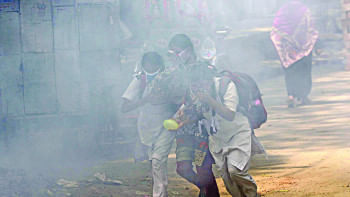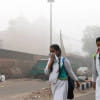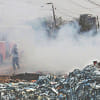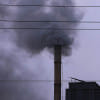Will I ever be able to breathe fresh air in Dhaka?

I can't remember the last time I inhaled fresh air in this city. Every day, as soon as I step out the door, I am exposed to severe dust pollution from the never-ending construction activities in the area. During my commute to any part of the capital from my home in Mirpur, I am forced to inhale the black smoke emanating from countless vehicles, particularly from unfit buses. I have been trying to survive this toxic air only by wearing a mask for the past few years. Like millions of people living in this city, I too do not know what I should be doing to save myself from such polluted air, as there are still no guidelines for us on how to deal with this severe health hazard that we are being exposed to day in and day out.
When taking my son to his school in Dhanmondi the other day, I was already feeling unwell because of the construction dust. But as soon as we got onto Mirpur Road, I felt suddenly unable to breathe properly. I tried to take deep breaths, desperate to get some more oxygen into my lungs, but the strong smell of the fumes from the vehicles around us was suffocating me. I was at a loss as to what to do when our CNG-run autorickshaw finally crossed the busy road and entered Road 27 in Dhanmondi, where the air seemed somewhat more tolerable.
Going through the newspapers later on, I learned that Dhaka had the fifth worst air in the world that day. The next day, the newspapers reported that air pollution has increased by around 13 percent in the capital since 2020, according to a study by the Centre for Policy Dialogue (CPD), despite the fact that the country received a staggering amount of funding to improve its air quality.
Since the beginning of this year, we have come across several alarming reports on our air quality. While one report found that poor air quality is contributing to a rise in premature births and babies being born with low birth weight in Dhaka, another report revealed that air pollution was causing about 20 percent of all premature deaths in the country. Yet another study has found that the average life expectancy of people in Bangladesh is being cut short by 6.8 years due to their continuous exposure to polluted air.
The CPD study has revealed some crucial facts about how air pollution is affecting the public. It has found that seven out of 10 people in the city suffer breathing problems, coughing, runny noses, sore throats, chest pains, and eye irritation due to air pollution, and that, on average, each Dhaka resident spends Tk 4,000 a year for diagnosis and treatment of symptoms thought to have been caused by polluted air. The economic and health loss from this preventable cause is unbelievable.
Sadly, all these concerning revelations have been met with scant response from the authorities. The Department of Environment (DoE), which is the responsible authority in this regard, could neither make the various city authorities coordinate their construction work and development projects, nor could it make the Bangladesh Road Transport Authority (BRTA) withdraw vehicles from the roads whose economic lives have long expired. The DoE could not even hold construction firms accountable for not covering their construction materials or for exacerbating dust pollution in the city. Is it any wonder that Dhaka's air quality index (AQI) score has remained in the "very unhealthy" category throughout the year?
Even some years ago, Dhaka's air quality would turn unhealthy in the winter and improve during the monsoon. But this is not the case anymore. Dhaka's air now remains toxic for nearly half the year, according to a Clean Air Fund (CAF) study. The CAF report mentioned that Bangladesh received a staggering $2.3 billion to curb air pollution between 2017 and 2021, but little improvement was made in this regard. So where did the money actually go?
Recently, I visited the new DoE office for work-related purposes. I was surprised to see an almost empty office on a weekday and at around 3pm in the afternoon. There was hardly anyone in the air quality department, except for the person I had gone there to meet. Reportedly, this new building was built using foreign funds to "curb air pollution."
Reportedly, a lot of the money that the DoE received over the last decade has been wasted on building construction, buying cars, sending its officials on foreign trips, and more while the actual work which the fund was meant for was neglected. A total of 296 officials went abroad for training in 10 years under the Clean Air and Sustainable Environment (CASE) project that was inaugurated in 2009. One official, who went abroad 10 times for training, does not even work with the DoE anymore. After the project was implemented, Dhaka's air quality actually deteriorated further. The parliamentary standing committee on the Ministry of Environment, Forest and Climate Change also raised concerns about the way in which the project funds for curbing air pollution were wasted. But the question is: was anyone held accountable for this sheer waste of funds? Not that I know of.
But all this is old news. What is the DoE and the environment ministry doing now to improve our air quality? Reportedly, they have set up 31 air quality monitoring stations across the country from which they will soon get data on our air quality every 15 minutes. The environment ministry will also set up some automatic vehicular inspection centres, where all vehicles will have to pass the emission test before being allowed to hit the roads.
But what will they do after receiving air quality reports from across the country? Will they take steps against the powerful quarters who are reportedly polluting our air, such as the brick kilns, transport owners, factories, and construction firms? How confident is the environment ministry that it can actually make transport owners put their vehicles through the emission tests?
Like myself, the people of the capital are tired of hearing the empty promises of authorities year after year. All we want to see is an improvement in our air quality. As an affected citizen of Dhaka, I will be more than happy to not have to see any unfit vehicles emitting black smoke throughout any and every road. I will be elated if I do not have to pass through the thick layers of dust emanating from the countless construction sites, including the government's megaprojects, on my way to work. Ensuring this much does not require any foreign funds. It only requires a strong will from those in charge. Is that too much to ask for?
Naznin Tithi is a member of the editorial team at The Daily Star.
Views expressed in this article are the author's own.
Follow The Daily Star Opinion on Facebook for the latest opinions, commentaries and analyses by experts and professionals. To contribute your article or letter to The Daily Star Opinion, see our guidelines for submission.


 For all latest news, follow The Daily Star's Google News channel.
For all latest news, follow The Daily Star's Google News channel. 












Comments